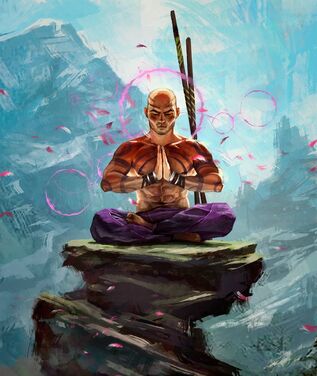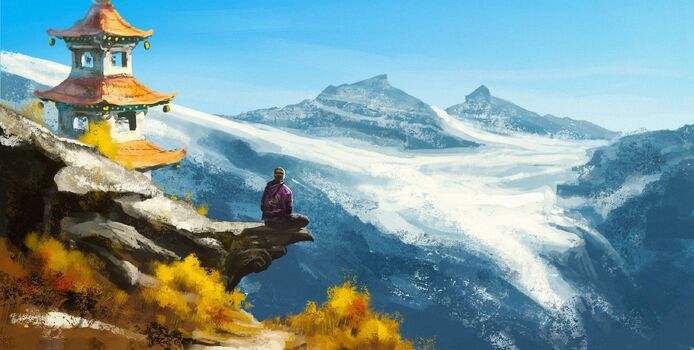State:[]

Celestial Plateau
Form of government:[]
Theocracy
Rulers:[]
Ino-to. Usually this is the oldest and wisest master, chosen by the masters of other schools. The title of ino-to is given posthumously. After the title is given, ino-to loses his name. He can from then on be only called that. Ino-to does not really rule the state. He gives advice and recommendations to school masters, who can perceive them as they see fit. However, the request of ino-to will actually be equated to the order. Ino-to communicates with other rulers of the states of Elinor through the bird's mail.
Language:[]
Itoshinian, slightly modified. Ulutau are always eager for the new knowledge. The Djunitian researcher Azir Amunjadee, who was visiting the Celestial Plateau, compiled a textbook of the Common Language. Almost every Ulutau has a good command of the Common Language, but among themselves the inhabitants of the Celestial Plateau communicate only in the Itoshinian.
Largest city:[]
-
Capital: []
Tokana. In Tokana there is a palace, where ino-to spends time in meditation and takes visitors. Ulutau pilgrims provide ino-to with provision and support the order in the palace, but after the pilgrimage they return to their schools. That is why it is difficult to call Tokana a city. It may happen that at some point between the pilgrimages there will be only one resident in Tokana – ino-to alone.
Other large cities: []
none. Ulutau settlements are small villages, called schools, where the master is both a spiritual and a public leader.
Geography and climate:[]
The Celestial Plateau is located high in the mountains, but has a mild warm climate. At the tops of the mountains there is always snow, but the temperature on the slopes where the settlements are located practically does not change in winter and summer. For the Celestial Plate blooming meadows, small forests, mountain rivers and lakes are common. A lot of wild fowl and fish. The soil is fertile.
Borders with:[]
Geographically –with the Ito Empire in the East, the Valley of the Ancestors in the South-East, the Dockol-Mo forest in the South. But in fact, there are only two places where it is possible to go to other lands. The border with the Ito Empire is the Path of Horror, guarded by terrible demons. The path was traversed by Tau, the founder of the people of Ulutau, and twice by the Djunitian explorer Azir Amunjadee. Other cases of passing the Path of Horror are not fixed. There is only an "exit” to the Valley of the Ancestors ". The Celestial Staircase is a monumental structure of ancient epochs, leading down the slopes and ending with a huge waterfall. The one who stepped into the waterfall is carried to the Valley of the Ancestors. It is not possible to climb back along steep rocks back. Therefore, Ulutau rarely descend from the mountains, and if they descend, it is forever.
History:[]
According to the legend, the formation of the Ulutau people began when the young Itoshin named Tau fell in love with the Emperors’ daughter Tsvetsho. Tau was a personal messenger of the Emperor and often visited his palace. He asked the Emperor for the hand of Tsvetsho, but Tosho became furious, for he did not want his immortal daughter to be given to a simple subject. Since then, Tosho has forbidden the men of the Itoshinian people from looking at her. Emperor was going to execute Tau. However, the young man said that he admits his guilt, because he did not cope with his own heart and inner passions, with what he had betrayed the Empire and its’ sacred Code. Tau asked the Emperor to spare his life, so that he can try to pass the not yet conquered Path of Horror and either perish there, or atone for his crime by a great feat. Touched by the nobility of the young man, the Emperor granted him forgiveness, and also ordered to found a settlement, if he will find a suitable land behind the Path of Horror. Several brave, young and strong men and women, decided to support Tau, for they were also impressed by his noble
impulses and brave heart.

According to the legends, Tau managed to discourage the
demons from the ancient relic, named Flesh of the Demon, which gave the pioneers on the Path an unprecedented power and helped to not become frightened. Tau and his comrades went through the Path of Horror and found themselves in a beautiful land, which they called - Ulu {Mountain, Majestic Mountains}. The name of the leader of the pioneers subsequently gave the name to a new doctrine, which is not at all similar to the philosophy of the Itoshins.
Already far from being a young man, but a mature man who had seen a lot, Tau rethought his life. He realized that everything that happened to him was not an accident. It seems that fate itself pushed him to create a new philosophy.
The essence of this teaching was the eternal path, aimed at improving ones inner world. The sage Tau himself pondered a lot about the Flesh of the Demon and the power inherent in the relic. And now he asked himself the question: is it possible to gain power and absolute fearlessness in oneself, without using the artefacts of antiquity? Since then, the Ulutau people began the eternal self-development and gaining strength through constant meditations, tempering the body and spirit and self-contemplation.
Once a huge bird flew into the mountain country, which brought a letter from the Emperor himself. He blessed the Tau deeds. Since then, the correspondence began between the Emperor and Tau, and afterwards – his followers.
The sage Tau died in a very old age. His body was burned, and ashes scattered all over the land, so that the soul of a sage became part of this country. The followers of the teaching, the uttered Ulutau people, built on the Celestial Plateau the city of Tokana, which was unprecedented in beauty and grandeur, where they continued to study the power. New and new sages began to interpret the teachings of Tau in their own way. They did not part from the foundations laid by the great teacher, but began to found their own schools, each of which became a separate settlement. Leaded the same schools the masters.
The people of Ulutau started families, raised children, ploughed the soil, engaged in hunting and fishing, but devoted all their spare time to self-development. Each school lived as a separate community, led by a master who was responsible not only for the spiritual development of his students, but also for their way of life. Each master assigned himself an apprentice disciple, who himself became a master after the death of the teacher.
The Bright Palace eventually lost its own school and became an abode of ino-to, where he spent all his time in constant meditation. Representatives of schools made regular pilgrimages to the Palace, monitored his condition, cleaned up, used archives and libraries, but never settled near.
In the country of Ulutau, there have never been murders and robberies and other manifestations of violence.
Industry, agriculture and economy: Agriculture is well developed. Hunting and fishing are popular. All food is equally divided within the community. There are smithies, pottery workshops, weaving is widespread. However, the concept of industry on a large scale is lacking. Ulutau not only have no money, but also no market in general. Natural exchange is not provided, as the population does not know the need for anything. Trade with other nations is not conducted due to geographical features.
Life and culture: All the free time of Ulutau is dedicated to meditation and self-knowledge. Literature is popular among the people, but the books of the Ulutau writers are, again, devoted to self-improvement. Ulutau have no novels. Poetry is also a rarity. The only artistic books popular in the Celestial Plateau are the stories and legends in the Common Language, rewritten by Azir Amunjadee. In Tokana there is a large library accessible to any Ulutau. In addition to the rare books of Amunjadee, one can find there works of Tau himself, as well as his followers. They describe the history of the people and its spiritual development. Fine art can be found in the Celestial Palace of Tokana in the form of frescoes. Ulutau is fond of painting for one selves, erecting this in the category of meditation. The paintings mainly depict local nature. A separate kind of art can be considered the drawing of tattoos on the body, but it is not common in all schools, and in some cases it is not welcomed at all. Applied art is not very developed. Ulutau's clothing is simple and convenient. Oral stories are rare, but there is a popular legend about the huge black dragon living on the highest mountain. Most likely, in it the dragon is presented as something mighty and incomprehensible, as the world itself. Evidence of eyewitnesses that dragons are found in the Ulutau mountains does not exist. The houses of the Ulutau people are fundamental, neat. There is no patriarchy or matriarchy. Women and men have equal status in society. Usually, children leave the parental home after they are three times six years old. All life of Ulutau is based on the development of the soul and body, which provides for both physical training and spiritual perfection.

Ideology:[]
Ulutau believe in the physical existence of the soul. The philosophy of the Ulutau assures that the life of the soul continues after the death of the body. However, the soul acquires some other form, and it is possible to understand what it is, only after comprehending the teachings of Tau. Despite the statement about the immortality of souls, Ulutau never appeals to his ancestors. Most likely, according to their worldview, the deceased person becomes part of the teachings of Tau. Through constant meditations, inner harmony is attained, which allows the Ulutau to physically change the world around. Because of the enclosed way of life of Ulutau, it is very difficult for the researchers from other nations to understand the depth of the ideology of the mountain people.
The Ulutau dialect:[]
in the Itoshinian language.
Despite the fact that almost all the words from the original Itoshinian language were preserved by the Ulutau, they are pronounced more melodically and softer. Ulutau intentionally try to stretch the words, and not shout them as quickly as the Itoshins. Moreover a lot of new words which do not exist in Itoshinian was added to Ulutau language, which relate only to the teachings of Tau in the field of self-knowledge. When talking, Ulutau will always be able to understand the Itoshin. But the Itoshin might not understand the Ulutau dialect.
Writing of words with hieroglyphs has been preserved. However, again, hieroglyphs have become much more complicated.
